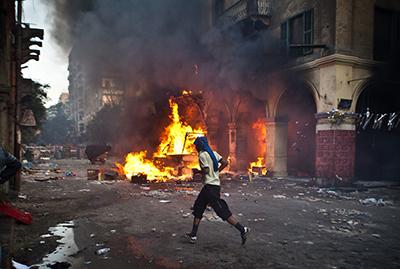Pressure on Journalists Rises Along With Africa’s Prospects
After a decade of unprecedented growth and development, the insistence on positive news remains a significant threat to press freedom in sub-Saharan Africa. By Mohamed Keita A newspaper displayed in the Ikoyi district of Lagos on September 30, 2013, tells of a deadly attack on a college in northeast Nigeria by suspected Boko Haram militants.…
Hassan Rouhani and the Hope for More Freedom in Iran
The new president may have limited power to enact change, but the practical needs for communications technology may work in favor of a freer press. By D. Parvaz In his early months in office, Iranian President Hassan Rouhani, pictured in Tehran June 17, 2013, focused primarily on foreign affairs. (Reuters/Fars News/Majid Hagdost)
While tech companies call for spying reform, telcos silent
On Monday, eight of the world’s leading technology companies set aside their rivalries to issue a direct challenge to U.S. lawmakers: lead the world by example and fix America’s broken surveillance state. Although the tech companies’ statement sends a powerful message, notably absent from the letter’s signatories is the appearance of a single telecommunications company,…
News outlets, Twitter targeted in alleged cyberattacks
New York, August 28, 2013–The Committee to Protect Journalists is alarmed by cyber-attacks on several websites on Tuesday, including The New York Times, whose site was disabled for several hours. The Syrian Electronic Army (SEA), a group of hackers who support President Bashar al-Assad of Syria, took credit for the attack via its Twitter account.…

Journalists detained, attacked amid unrest in Egypt
New York, August 19, 2013–New York, August 19, 2013–Several journalists working for international media said they were assaulted or briefly detained over the weekend. The attacks and harassment came as Egyptian authorities publicly accused international journalists of distorting coverage of recent events.
Post-Snowden, time for journalists to get smart
Let’s be clear: Everything journalists do in the digital world is open to scrutiny by suspicious minds because that’s the way intelligence agencies work. If state eavesdroppers didn’t make use of this amazing opportunity they wouldn’t be very good at their job.
Turkish mayor harasses BBC journalist on Twitter
New York, June 24, 2013–The Committee to Protect Journalists condemns a spurious and inflammatory Twitter campaign begun Sunday by Ankara Mayor Melih Gökçek against a local BBC reporter. Gökçek labeled BBC reporter Selin Girit as a traitor and a spy in apparent disagreement with the BBC’s coverage of anti-government protests that have swept the country.